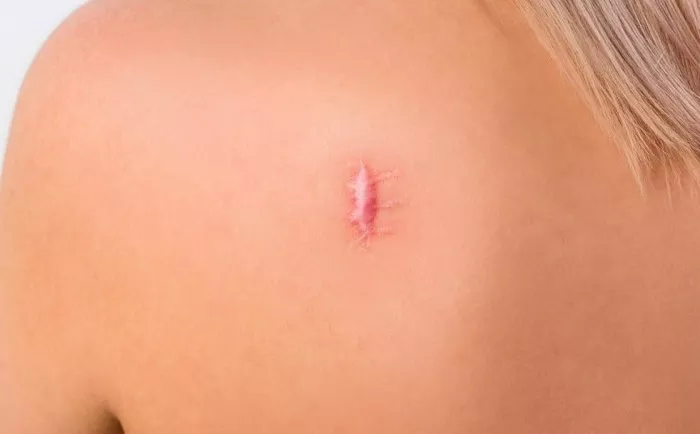Hypertrophic scars, characterized by their raised and thickened appearance, often prompt individuals to seek effective solutions for scar management. While medical interventions are available, a growing interest in natural approaches has led many to explore home remedies for hypertrophic scars. This comprehensive guide delves into a variety of home-based solutions, exploring the science behind these remedies and providing insights into their potential effectiveness. From common kitchen ingredients to age-old practices, this article aims to empower individuals with the knowledge to address hypertrophic scars in the comfort of their homes.
Understanding Hypertrophic Scars
Hypertrophic scars result from an overproduction of collagen during the healing process, leading to a raised and often discolored scar. These scars can be the aftermath of injuries, surgeries, or skin conditions. While they are generally benign, their appearance can cause discomfort, both physical and emotional. Exploring home remedies for hypertrophic scars involves understanding the underlying processes of scar formation and identifying natural elements that may aid in minimizing their prominence.
Aloe Vera
Aloe vera stands as a stalwart in the realm of natural remedies, known for its soothing and healing properties. Applied topically, aloe vera gel is believed to offer relief to hypertrophic scars. Rich in antioxidants and possessing anti-inflammatory qualities, aloe vera may assist in calming the skin, reducing redness, and promoting a more even skin texture. The application of fresh aloe vera gel or products containing high-quality aloe vera extract is a common home remedy embraced by those seeking a natural approach to scar management.
The Healing Touch of Vitamin E
Vitamin E, renowned for its antioxidant properties, is often considered in the realm of scar care. When applied topically, vitamin E oil or capsules can potentially contribute to scar reduction. It is believed to moisturize the skin, improve elasticity, and aid in the fading of scars over time. While some individuals find success with this remedy, it’s essential to exercise caution as excessive application of vitamin E may lead to irritation. Balancing the use of vitamin E with other home remedies is key to a comprehensive and effective scar management routine.
Onion Extract
The pungent aroma of onions may hold a secret weapon against hypertrophic scars. Onion extract, available in various over-the-counter scar creams, is believed to possess scar-reducing properties. The extract is thought to inhibit collagen production, helping to flatten and fade scars. While applying onion extract directly to the skin may not be everyone’s preference due to the odor, the availability of commercial products offers a more user-friendly option for those exploring home remedies for hypertrophic scars.
The Power of Massage
Simple yet effective, massage is a home remedy that may contribute to scar improvement. Gently massaging the hypertrophic scar and the surrounding tissue stimulates blood flow and collagen remodeling. This action may help break down scar tissue, making it more pliable and reducing its raised appearance. Incorporating natural oils such as coconut oil or vitamin E oil during the massage can enhance the moisturizing and skin-nourishing effects. Consistency is key when opting for massage as a home remedy, and individuals should tailor the intensity to their comfort levels.
Honey’s Sweet Benefits
Honey, celebrated for its antimicrobial and moisturizing properties, is another contender in the arsenal of home remedies for hypertrophic scars. Applying honey to scars may aid in keeping the area moisturized, promoting a conducive environment for healing. Additionally, honey’s antimicrobial qualities may help prevent infections, which can be crucial during the initial stages of scar formation. Whether used alone or in combination with other natural ingredients, honey offers a sweet alternative for those seeking gentle and natural scar care.
The Efficacy of Silicone Sheets
While not a kitchen staple, silicone sheets have gained popularity as a home remedy for hypertrophic scars. These sheets create a protective barrier over the scar, helping to hydrate the tissue and modulate collagen production. The pressure exerted by silicone sheets can also assist in flattening raised scars. Widely available in drugstores, silicone sheets are an accessible option for individuals looking to incorporate a non-invasive, at-home approach to scar management.
Lemon Juice
Lemon juice, with its natural acidity and vitamin C content, is often suggested as a home remedy for scar lightening. The citric acid in lemon juice is believed to have exfoliating properties, potentially aiding in the removal of dead skin cells and promoting a more even skin tone. However, it’s crucial to exercise caution when using lemon juice, as its acidity may cause irritation, especially on sensitive skin. Diluting lemon juice with water and performing a patch test can help individuals determine its suitability for their scar care routine.
Turmeric’s Golden Touch
Turmeric, a spice celebrated for its vibrant color and culinary versatility, is also revered for its potential therapeutic benefits. Curcumin, the active compound in turmeric, possesses anti-inflammatory and antioxidant properties. Some individuals explore the application of a turmeric paste directly onto hypertrophic scars, believing that it may contribute to reducing inflammation and promoting healing. Combining turmeric with other natural ingredients, such as honey or aloe vera, enhances its application and may offer a holistic approach to scar care.
Tea Tree Oil
Tea tree oil, known for its potent antiseptic properties, is a home remedy that some individuals turn to for hypertrophic scars. Diluted tea tree oil can be applied topically to scars, with its antimicrobial qualities potentially assisting in preventing infections. As with any essential oil, it’s crucial to dilute tea tree oil adequately to avoid skin irritation. While research on tea tree oil’s specific effects on hypertrophic scars is limited, its historical use as a natural antiseptic makes it an intriguing option for those seeking alternative scar care solutions.
Maintaining Patience and Consistency
While exploring home remedies for hypertrophic scars, it’s essential to approach scar care with realistic expectations and consistency. Results may vary among individuals, and the effectiveness of home remedies often depends on factors such as scar type, individual skin response, and the chosen remedies. Patience is key, as natural approaches typically require time to manifest visible improvements.
Conclusion
In conclusion, home remedies for hypertrophic scars offer a natural and accessible approach to scar management. From the soothing properties of aloe vera to the potential scar-reducing effects of onion extract, individuals have a range of options to explore in the comfort of their homes. The key lies in understanding the unique benefits of each remedy, tailoring approaches to individual preferences, and maintaining a consistent routine.
As individuals embark on the journey of nurturing skin health naturally, it’s advisable to consult with healthcare professionals, especially for those with pre-existing skin conditions or allergies. The integration of home remedies into a holistic scar care routine, complemented by good skincare practices, may contribute to the gradual improvement of hypertrophic scars. By unlocking nature’s solutions and embracing the simplicity of home-based approaches, individuals can empower themselves in their quest for smoother, more resilient skin.
[inline_related_posts title=”You Might Be Interested In” title_align=”left” style=”list” number=”6″ align=”none” ids=”3331,3359,3329″ by=”categories” orderby=”rand” order=”DESC” hide_thumb=”no” thumb_right=”no” views=”no” date=”yes” grid_columns=”2″ post_type=”” tax=””]































